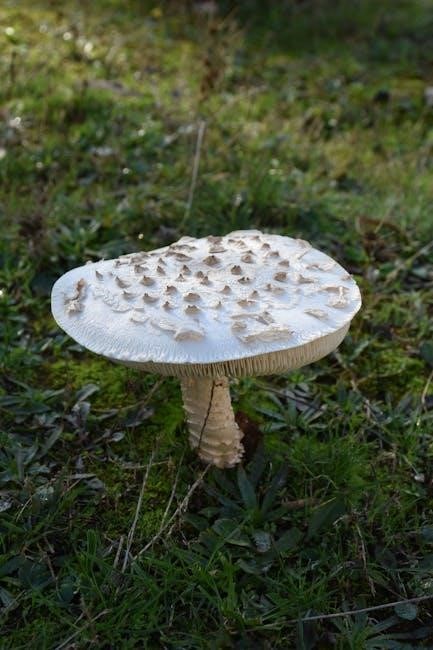Many common household foods can be toxic to dogs, posing serious health risks. Awareness of these foods is crucial for dog owners to ensure their pets’ safety and well-being.

Overview of Common Foods Toxic to Dogs
Several everyday foods can be harmful or even fatal to dogs. Chocolate, grapes, raisins, onions, garlic, and macadamia nuts are among the most toxic. These foods can cause severe health issues, including vomiting, diarrhea, kidney failure, or even death. Xylitol, a sugar substitute found in gum and sweets, is also highly dangerous, leading to rapid blood sugar drops and liver failure. Avocados, while not as toxic, contain persin, which can still harm dogs in large amounts. Alcohol and caffeine are additional culprits, affecting dogs’ nervous systems. Awareness of these common toxins is crucial for pet owners to prevent accidental poisoning and ensure their dogs’ safety.
Importance of Awareness for Dog Owners
Recognizing which foods are toxic to dogs is essential for pet owners to prevent accidental poisoning. Many common household items, such as chocolate, grapes, and onions, can be harmful or even fatal if ingested. Awareness allows owners to secure their homes, avoid dangerous foods, and educate others. Early recognition of symptoms can lead to timely veterinary intervention, improving outcomes. Staying informed about toxic foods empowers owners to make safe choices, ensuring their dogs’ health and well-being. Knowledge truly is the first line of defense in protecting pets from preventable food-related illnesses.

Common Poisonous Foods for Dogs
Chocolate, grapes, onions, garlic, macadamia nuts, and xylitol are among the most toxic foods for dogs, posing severe health risks if ingested.
Chocolate
Chocolate contains theobromine, a compound toxic to dogs. Dark chocolate and cocoa powder are the most dangerous due to higher theobromine levels. Symptoms of chocolate poisoning in dogs include vomiting, diarrhea, increased heart rate, and seizures. Even small amounts can cause mild symptoms, while larger doses may lead to more severe health issues, including heart failure or death. It’s crucial for dog owners to keep all chocolate products out of reach and seek immediate veterinary care if ingestion occurs.
Grapes and Raisins
Grapes and raisins are highly toxic to dogs, with the potential to cause kidney failure even in small amounts. The exact mechanism of toxicity is unknown, but both fresh and dried forms are dangerous. Dogs of any age, breed, or size are at risk, and symptoms can include vomiting, lethargy, and loss of appetite. If ingestion occurs, immediate veterinary attention is essential to prevent severe complications. Owners should avoid sharing grapes or raisins in any form, as even trace amounts can lead to serious health issues.
Onions and Garlic
Onions and garlic belong to the Allium family and contain compounds that can damage a dog’s red blood cells, leading to anemia. Both raw and cooked forms, as well as any food containing these ingredients, are toxic. Even small amounts can cause gastrointestinal upset, while larger quantities may lead to more severe health issues. Symptoms include vomiting, diarrhea, lethargy, and pale gums. If you suspect your dog has ingested onions or garlic, contact your veterinarian immediately for guidance. It’s crucial to keep all dishes and seasonings containing these ingredients out of your dog’s reach to prevent accidental ingestion.
Macadamia Nuts
Macadamia nuts are highly toxic to dogs, even in small amounts. Ingestion can cause weakness, depression, vomiting, tremors, and hyperthermia. These symptoms typically appear within 3-12 hours and can last up to 48 hours. The exact toxin responsible is unknown, but it affects the nervous system and muscles. While the effects are usually temporary, they can still be distressing for the dog. If you suspect your dog has eaten macadamia nuts, contact your veterinarian immediately for advice. It’s essential to keep these nuts and any products containing them out of your dog’s reach to prevent potential harm.
Xylitol
Xylitol, a sugar substitute commonly found in sugar-free gum, mints, baked goods, and some peanut butters, is highly toxic to dogs. It can cause a rapid drop in blood sugar and, in severe cases, liver failure. Symptoms develop quickly, often within 15-30 minutes, and include vomiting, lethargy, seizures, and tremors. Even small amounts can be dangerous, depending on the dog’s size. If you suspect xylitol ingestion, contact your veterinarian immediately for emergency care. Always check food labels and keep products containing xylitol far out of your dog’s reach to prevent accidental poisoning.
Avocados
Avocados contain a toxic compound called persin, which can be harmful to dogs. While the flesh is relatively less toxic, the pit, skin, and leaves contain higher concentrations. Ingestion can cause vomiting, diarrhea, and abdominal pain. In severe cases, it may lead to fluid buildup in the lungs or pancreatitis. Even small amounts, especially if unripe, can be dangerous. Keep all parts of the avocado out of your dog’s reach and consult a vet immediately if ingestion occurs to ensure your pet’s safety and prevent potential complications.
Alcohol
Alcohol is highly toxic to dogs, as their bodies metabolize it much slower than humans. Even small amounts can cause severe health issues, including vomiting, drooling, lethargy, and difficulty breathing. In severe cases, alcohol ingestion can lead to coma or death. Ethanol, found in alcoholic beverages, is particularly dangerous. Keep all alcohol products, including beer, wine, and spirits, out of your dog’s reach. If your dog ingests alcohol, contact your veterinarian immediately for emergency care to prevent long-term health complications.
Caffeine
Caffeine, found in coffee, tea, energy drinks, and some medications, is toxic to dogs. It can cause hyperactivity, restlessness, an increased heart rate, and even heart failure. Symptoms may progress to seizures or coma if left untreated. Even small amounts can be dangerous, as dogs metabolize caffeine slowly. Keep caffeinated products out of reach and avoid sharing any foods or beverages containing caffeine with your dog. If accidental ingestion occurs, contact your veterinarian immediately for guidance and potential emergency treatment to ensure your dog’s safety and prevent serious health complications.

Symptoms of Food Poisoning in Dogs
Symptoms include vomiting, diarrhea, lethargy, loss of appetite, abdominal pain, and drooling. Severe cases may cause seizures, tremors, or difficulty breathing, requiring immediate veterinary attention.
Common Signs of Toxicity
When a dog ingests poisonous food, common signs of toxicity may include vomiting, diarrhea, lethargy, and loss of appetite. These symptoms often appear within hours of consumption. In some cases, dogs may exhibit drooling, shaking, or difficulty breathing. It’s crucial for owners to recognize these signs early, as they can indicate the need for urgent veterinary care. Monitoring your dog’s behavior after exposure to potentially toxic substances is essential to ensure their health and safety. Always consult a veterinarian if you suspect your dog has eaten something harmful.
Emergency Indicators
In severe cases of poisoning, dogs may exhibit emergency indicators such as seizures, difficulty breathing, or collapse. These symptoms require immediate veterinary attention. If your dog shows signs of extreme distress, such as tremors, rapid heart rate, or loss of consciousness, contact your vet or an emergency animal hospital right away. Time is critical in these situations, as delays can lead to irreversible damage or even death. Always keep your vet’s contact information handy and be prepared to provide details about the suspected toxin and the amount consumed to ensure prompt and effective treatment.
What to Do If Your Dog Ingests Poisonous Food
Stay calm and contact your veterinarian immediately for guidance. Provide details about the food and amount consumed to ensure proper advice and treatment for your dog.
Immediate Actions for Dog Owners
If your dog ingests poisonous food, act swiftly. Remain calm and contact your veterinarian or a pet poison hotline immediately. Provide detailed information about the food consumed, including the type, amount, and time of ingestion. This ensures effective treatment. Do not induce vomiting unless instructed by a professional, as it may worsen the situation. Keep the packaging or a sample of the food handy for reference. Prompt action can significantly improve your dog’s prognosis and prevent severe health complications.
When to Contact a Veterinarian
If you suspect your dog has ingested a poisonous food, contact your veterinarian immediately. Even if symptoms are not visible, prompt action is crucial. Seek advice if your dog consumes any known toxic substances, such as chocolate, grapes, or xylitol. If your dog shows signs like vomiting, lethargy, or difficulty breathing, urgent care is needed. Do not delay seeking professional help, as early treatment improves outcomes. Always consult your vet before inducing vomiting or administering any treatment at home. Timely intervention can prevent severe health complications and ensure your dog’s safety.
Safe Human Foods for Dogs
Certain human foods are safe for dogs in moderation, such as carrots, green beans, apples, and plain yogurt. These can serve as healthy, digestible treats for your pet;
Foods That Are Safe in Moderation
While many human foods are toxic to dogs, some are safe when given in moderation. Carrots, green beans, and apples are excellent choices, providing essential vitamins and fiber. Plain, unflavored yogurt can aid digestion, while small portions of cooked chicken or turkey offer lean protein. However, it’s crucial to avoid adding seasonings or fats. Always introduce new foods gradually to monitor for any adverse reactions. Consulting a veterinarian before sharing human foods ensures your dog’s dietary needs are met safely. Moderation is key to maintaining a balanced and healthy diet for your pet.
Guidelines for Feeding Human Foods
Feeding human foods to dogs requires careful consideration to ensure safety. Always prioritize a balanced, nutrient-rich dog food as the primary diet. When introducing human foods, choose plain, unseasoned options like boiled chicken or sweet potatoes. Avoid foods with added salts, sugars, or spices. Portion control is essential, with treats not exceeding 10% of daily calorie intake. Research each food’s safety and consult a veterinarian, especially for puppies or dogs with health conditions. Never feed toxic substances like chocolate or grapes, and always monitor for signs of digestive upset. A cautious approach ensures human foods complement, not harm, your dog’s health.

Preventive Measures
Secure toxic foods, use pet-safe storage, and educate family members on dangerous items. Regularly inspect your home for potential risks to ensure your dog’s safety and well-being.
How to Dog-Proof Your Home
To keep your dog safe, store toxic foods in high cabinets with secure latches. Keep trash cans tightly sealed and avoid leaving hazardous items like chocolate or medications within reach. Regularly inspect your home for potential risks, such as loose wires or toxic plants. Educate family members and visitors about dangerous foods and substances. Designate safe zones for your dog where they can relax without accessing harmful items. By taking these steps, you can create a secure environment that protects your dog from accidental poisoning and ensures their overall well-being.
Education and Awareness
Educating yourself about toxic foods is essential to protect your dog. Research common poisonous foods like chocolate, grapes, and onions, and understand their risks. Stay informed through reliable sources such as the ASPCA or veterinary guidelines. Share this knowledge with family and friends to ensure everyone understands what foods are unsafe. Regularly review and update your awareness as new information emerges. By prioritizing education, you can prevent accidents and create a safer environment for your dog. Awareness truly is the first line of defense in keeping your furry friend healthy and safe.
Resources for Dog Owners

The ASPCA Animal Poison Control Center provides essential resources, including a 24/7 hotline and downloadable guides, to help dog owners identify and manage toxic food ingestion.
Visit their website for detailed information and emergency assistance to ensure your dog’s safety and well-being.
ASPCA Animal Poison Control Center

The ASPCA Animal Poison Control Center (APCC) is a vital resource for dog owners. With a 24/7 hotline ((888) 426-4435), the APCC provides expert guidance on potential toxicities. For a consultation fee, their team of veterinarians and toxicologists offers tailored advice based on the amount and type of ingested substance. This service is especially critical in emergencies, where timely intervention can save lives; The APCC also maintains a comprehensive list of toxic substances, including foods, plants, and household items. Dog owners can rely on this trusted resource for accurate information and urgent care recommendations, ensuring their pets receive the best possible outcomes.
Downloadable PDF Guides
Downloadable PDF guides provide a convenient resource for dog owners to identify and avoid poisonous foods. These guides, available from organizations like the ASPCA, list toxic substances, including common household foods, and outline symptoms of poisoning. They also offer emergency steps and contact information for professional help. Many guides are designed to be user-friendly, with clear charts and checklists to ensure quick access to critical information. By keeping these guides handy, pet owners can make informed decisions and act swiftly in case of an emergency, helping to protect their dogs from potential harm. Regular updates ensure the information remains relevant and accurate.
Understanding which human foods are poisonous to dogs is essential for ensuring their safety and well-being. Common culprits like chocolate, grapes, and xylitol can cause severe health issues, even death. By educating themselves and taking preventive measures, dog owners can significantly reduce the risk of accidental poisoning. Resources like the ASPCA Animal Poison Control Center and downloadable PDF guides provide valuable information to help identify toxic substances and outline emergency steps. Vigilance and awareness are key to protecting dogs from harmful foods, ensuring they lead happy and healthy lives. Always prioritize your dog’s safety by keeping dangerous foods out of reach.
